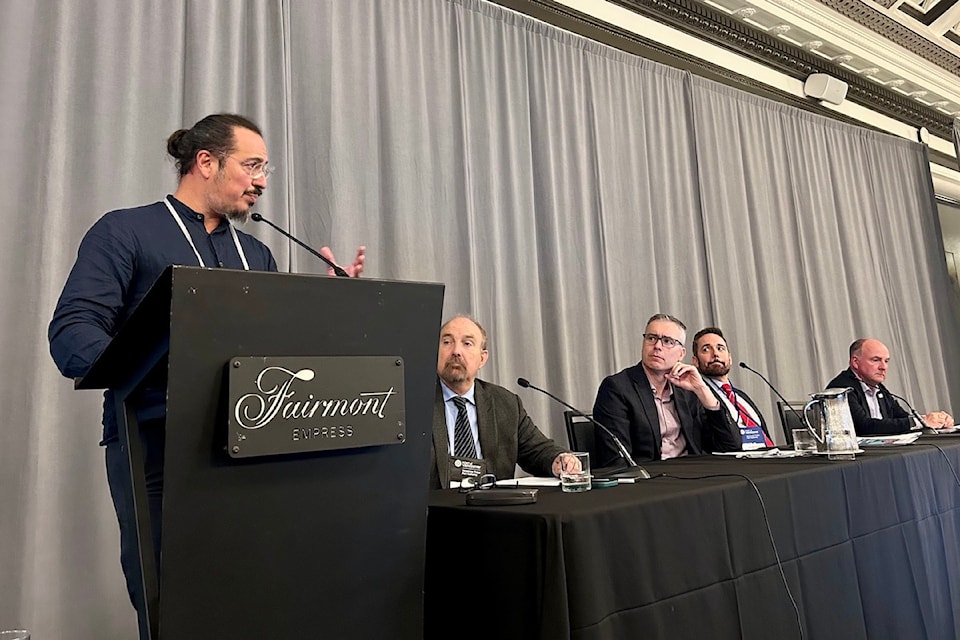Health
B.C. Shelter CEO Advocates for Involuntary Care Amid Addiction Crisis

The head of a prominent shelter in Victoria, British Columbia, is calling for a fundamental shift in the province’s approach to homelessness and addiction. Julian Daly, CEO of Our Place, addressed the Union of B.C. Municipalities (UBCM) on September 22, 2023, advocating for the recognition of addiction as a health crisis that may require involuntary treatment for those unable to make informed decisions about their care.
Daly made his remarks during the UBCM convention, which focuses heavily on issues surrounding street disorder and homelessness. He stated that allowing individuals suffering from severe addiction to remain on the streets without necessary care equates to “abandonment.” He emphasized the urgent need for a coordinated regional response, urging the provincial government to increase funding and resources for supportive housing and shelters.
The convention features a series of workshops and discussions aimed at addressing the complexities of homelessness. Among the panelists was Dr. Daniel Vigo, a special advisor to the province on psychiatry and addiction. He highlighted several factors contributing to the crisis, including the closure of the Riverview psychiatric hospital, the rise of potent synthetic drugs, and the lack of integrated care for mental health and addiction issues.
Daly’s comments resonated with several panelists, including Nanaimo Mayor Leonard Krog, who praised his clear articulation of the challenges faced by the unhoused community. Reflecting on his 17 years of experience in the field, Daly noted a dramatic change in the landscape of addiction. “Alcohol was once the primary drug of choice, but today, the situation is almost unrecognizable,” he said. The emergence of drugs like fentanyl and carfentanil, both significantly more potent than traditional opioids, has transformed the crisis.
Dr. Vigo supported Daly’s observations, stating that the strength of drugs has increased exponentially over the past decade. He pointed out that opioid overdoses can lead to brain damage due to oxygen deprivation, further complicating the health crisis. “We know that the brain volume decreases in this population compared to control,” he stated, underscoring the urgent need for comprehensive care.
Daly voiced concerns about the impact of decriminalization, suggesting that well-intentioned policies have inadvertently exacerbated the problem. He criticized “catch-and-release” policing practices, which have diminished the ability of law enforcement to deter public drug use. “What was once hidden is now everywhere,” he remarked, highlighting the normalization of disturbing behaviors on the streets.
He proposed a dual approach that combines enforcement against drug trafficking with enhanced healthcare and housing support for individuals struggling with addiction and mental illness. “Compassion must be balanced with accountability,” Daly asserted, advocating for targeted enforcement against those exploiting vulnerable populations.
The UBCM convention will continue until September 26, 2023, with discussions aimed at generating actionable solutions to the pressing issues of homelessness and addiction in British Columbia. As the crisis unfolds, the emphasis remains on collaborative efforts among police, health authorities, non-profits, and housing services to create an integrated response that addresses both the immediate needs and long-term solutions for those affected.
-

 Science2 months ago
Science2 months agoToyoake City Proposes Daily Two-Hour Smartphone Use Limit
-

 Health2 months ago
Health2 months agoB.C. Review Reveals Urgent Need for Rare-Disease Drug Reforms
-

 Top Stories2 months ago
Top Stories2 months agoPedestrian Fatally Injured in Esquimalt Collision on August 14
-

 Technology2 months ago
Technology2 months agoDark Adventure Game “Bye Sweet Carole” Set for October Release
-

 World2 months ago
World2 months agoJimmy Lai’s Defense Challenges Charges Under National Security Law
-

 Technology2 months ago
Technology2 months agoKonami Revives Iconic Metal Gear Solid Delta Ahead of Release
-

 Technology2 months ago
Technology2 months agoSnapmaker U1 Color 3D Printer Redefines Speed and Sustainability
-

 Technology2 months ago
Technology2 months agoAION Folding Knife: Redefining EDC Design with Premium Materials
-

 Technology2 months ago
Technology2 months agoSolve Today’s Wordle Challenge: Hints and Answer for August 19
-

 Business2 months ago
Business2 months agoGordon Murray Automotive Unveils S1 LM and Le Mans GTR at Monterey
-

 Lifestyle2 months ago
Lifestyle2 months agoVictoria’s Pop-Up Shop Shines Light on B.C.’s Wolf Cull
-

 Technology2 months ago
Technology2 months agoApple Expands Self-Service Repair Program to Canada









